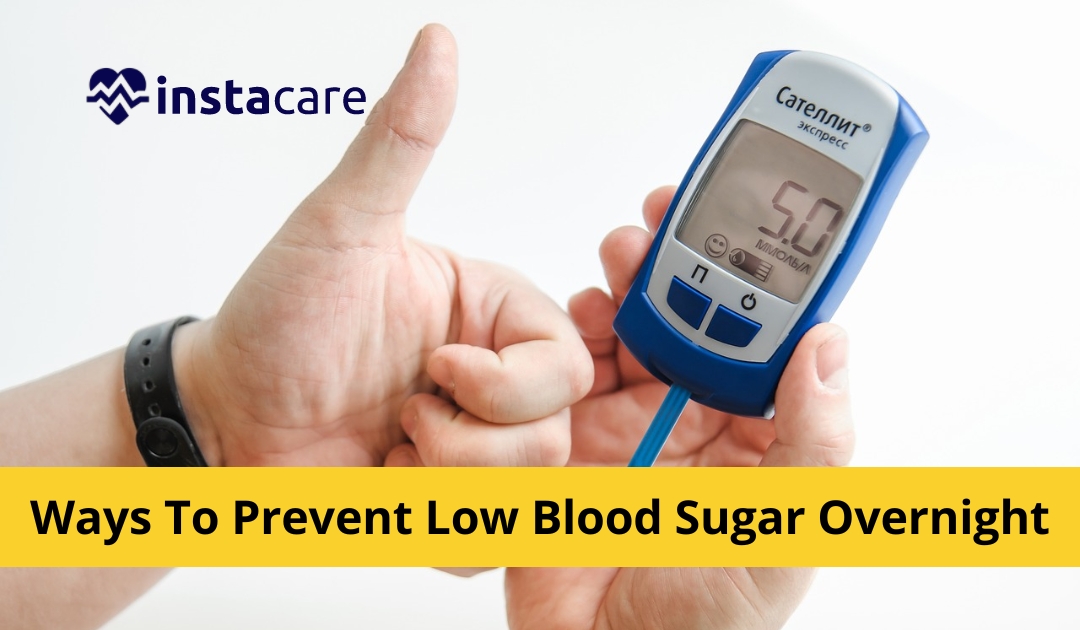If you're living with diabetes, you know that controlling your blood sugar levels is critical for maintaining a healthy lifestyle. Low blood sugar overnight can be particularly troublesome as it can cause fatigue and confusion the following day, affecting both concentration levels and performance.
Fortunately, there are several simple steps you can take to reduce the risk of low blood sugar while asleep. In this blog post, we'll take a look at seven ways to help prevent nocturnal hypoglycemia so you can wake up feeling alert and energized every morning.
What is low blood sugar (hypoglycemia)?
Low blood sugar (hypoglycemia) is a condition caused by excessively low levels of sugar in the blood. Symptoms, which vary from person to person, such as sweating and shakiness, are usually experienced when the blood sugar level drops below 70 mg/dl.
In order to prevent this dangerous situation from occurring overnight, it’s important for those at risk for hypoglycemia to consume snacks or meals with a mix of healthy carbohydrates and proteins - this will help their body maintain a stable glucose level throughout the night.
If you experience any symptoms associated with low blood sugar, it’s best to check your blood sugar immediately. Unmonitored and untreated hypoglycemia can lead to serious health complications that can be easily avoided when proper preventative measures are taken.
Ways to prevent low blood sugar overnight
1- Check your blood sugar before bed
It is important to check your blood sugar before bed every night. Preventing low blood sugar overnight can have a significant impact on your overall health and well-being. As such, many medical professionals recommend monitoring your blood glucose levels at least four times a day and always just before going to sleep so that you can take any necessary steps to keep your levels steady throughout the night.
Taking the time to prepare ahead of time to ensure decent glucose levels while you’re asleep can mean the difference between feeling energized and refreshed when you wake up or suffering from a harsh crash in energy due to hypoglycemia in the middle of the night. Make sure that you are sleeping soundly by taking two minutes each evening to double-check your sugar levels before tucking in for the night.
2- Know the signs of low overnight blood sugar
Sleeping at night is essential for our overall health and well-being, but for those living with diabetes, managing low blood sugar levels overnight presents a unique challenge. Fortunately, being aware of the signs of low blood sugar overnight and taking steps to prevent it can help you stay healthy and safe.
Common signs include clouded or blurred vision, feeling lightheaded and dizzy, irritability or confusion, nightmares or vivid dreams and changes in sleep pattern. If you experience any of these during the night, be sure to take quick action such as eating a snack with a protein and carbohydrate to bring your blood sugar level back up. Even if these steps are taken though, checking your blood sugar levels in the morning is still recommended to ensure optimal results.
3- Don’t skip dinner
Making sure not to skip dinner is integral to maintain a healthy and balanced lifestyle. Not only does it give us necessary energy throughout the day, but it also ensures that our body doesn't suffer any nutritional disbalances overnight.
Preventing low blood sugar overnight has many benefits, such as preventing fatigue during the day, helping focus and concentration when doing activities, aiding in better sleeping habits and helping people resist cravings which could damage their dietary habits.
Eating dinner is a powerful way to ensure your body runs at an optimal level throughout the night, promoting more restful sleep. Make sure you don’t miss out on its benefits - take time for dinner every night!
View More: 10 Foods To Avoid With Diverticulitis
4- Avoid excessive exercise late at night
Late-night exercise is not recommended for most individuals as it can disrupt your body's natural sleep patterns, preventing you from getting the optimal amount of rest. It can also lead to later episodes of low blood sugar overnight, which results in fatigue or headaches the following day.
To prevent this from occurring, try to exercise at least three hours before bedtime so that your body has enough time to recover and avoid putting undue strain on your system. Furthermore, having a small snack before bedtime can help to prevent low blood sugar overnight and ensure that you have energy throughout the day.
5- Be prepared
Preparation is key to success in any domain, and this especially applies when managing a chronic health problem like diabetes. Preventing low blood sugar is critical to ensuring the best possible glycemic control. Some of the most common tips for preventing hypoglycemia overnight include eating a balanced dinner that includes protein, having a small snack before bed, planning ahead for morning activities, keeping snacks handy near your bedside, and wearing diabetes medical alert bracelet. Taking small steps like these can make all the difference when attempting to keep your blood sugar levels within the ideal range.
6- Consider a continuous glucose monitor
Preventing low blood sugar (hypoglycemia) overnight can be a challenging though important task for those managing diabetes. A continuous glucose monitor (cgm) provides a way to track and maintain healthy blood sugar levels while sleeping. With a cgm, users are able to keep an eye on their levels throughout the night and take prompt action if needed.
Moreover, they provide real-time data of trends making it easier to anticipate potential risks and intervene accordingly. From children to the elderly, these devices are used by people of all ages who are managing diabetes and looking for an effective way to do so.
7- Try to manage your stress levels
Many people experience heightened levels of stress throughout the day. When left unchecked, this can eventually lead to physical and mental health problems. Preventing low blood sugar at night is one way to maintain your stress levels.
Eating a balanced dinner of carbohydrates, proteins and vegetables can help balance glucose in the blood and avoid uncomfortable hypoglycemic episodes that can contribute to feeling agitated or scared when trying to sleep.
Additionally, if needed, you may consider taking natural supplements like rhodiola rosea that has been clinically shown to reduce cortisol (the stress hormone) levels in the body as well as support overall wellbeing. Taking an hour before bedtime can promote relaxation and prepare you for a nourishing restful evening.
View More: How To Raise Low Blood Pressure 11 Important Tips
Conclusion
If you suffer from low blood sugar, it's important to take steps to prevent it. There are a few things you can do to help your body regulate blood sugar levels overnight. By following these tips, you can wake up feeling refreshed and ready to start your day. Do you have any other tips for preventing low blood sugar overnight? Let us know in the comments below!
Please book an appointment with the best Nutritionist in Lahore, Karachi, Islamabad, and all major cities of Pakistan through InstaCare, or call our helpline at 03171777509 to find a verified doctor for your disease.
Source: https://instacare.pk/blog/ways-to-prevent-low-blood-sugar-overnight








